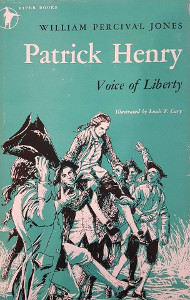Patrick Henry: Voice of Liberty

Author:
William Percival Jones
Illustrator:
Louis F Cary
Publication:
1960 by Houghton Mifflin Company
Genre:
Biography
Series:
Piper Books ![]() Members Only
Members Only
Current state:
This book has been evaluated and information added. It has been read but content considerations may not be complete.
Book Guide
Search for this book used on:
"Pat! Pat! Wake up. I smell smoke."
Patrick rubbed his eyes sleepily.
"Smoke?" he asked. Suddenly, he sat up, too. "You do! Quick. See to the children. I'll try to find the fire."
Pat was wide awake now. The fire was coming from the kitchen. The whole room was in flames, and Pat could see at a glance that it would be useless to fight the fire.
But Pat was not easily discouraged. His father had given him a good education, he had a grand way with words, and when he spoke he could keep men spellbound. The study of law was a perfect choice.
These were exciting times. All through the Colonies men were protesting what they thought were unjust taxes imposed by England. Patrick was elected to the House of Burgesses where he spoke eloquently against the Stamp Act, and his report to the Virginia Convention, in which he declared war with England was inevitable, contains the immortal line "give me liberty, or give me death!"
Patrick Henry had become a great patriot and statesman. In this lively biography we see how his childhood characteristics of loyalty and bravery remained with him as he fought for the causes of liberty; how his ability to listen enabled him to represent large numbers of men; and how his love for oratory led him to become a leader of the people in their fight for freedom.
From the book
To write Patrick Henry: Voice of Liberty, Mr. Jones read the several scholarly biographies written to date but felt that only the newest of them, by Robert Bouthat Meade, gives a fair picture of the man. In the preparation of this book, he writes, "I was able to get quite a feel for Henry by visiting his birthplace, Studley, and the places where he lived out his rather eventful life.
From the book
Author's Note
Very little is known about Patrick Henry's childhood. We know where and when he was born. We know a great deal about his parents. We also know that he attended what seems to have been a boarding school until he was ten and that he was tutored by his father and perhaps by his uncle, the Reverend Patrick Henry, until he was apprenticed to a merchant. He was well trained in French, mathematics, history, English, and especially in Latin, which he had learned to speak.
The story told here about Patrick's childhood is fiction, but it is based on known facts. We know enough about the way people lived in Virginia during the colonial days to be able to tell how Patrick Henry probably lived.
Uncle Langloo was real. We know Patrick loved the outdoors and hunting. Although the Indian hunting story in Chapter 5 is fiction, it might have happened. And so with the rest of the story of Patrick's boyhood. I made up the tree climbing story in Chapter 3, yet it is a fact that there was a colored boy at Studley who could climb a tree upside down. We know Patrick Henry was brave, even as a boy, so this story could have happened.
Historic St. John's Church, where Patrick Henry made some of his greatest speeches, is still standing in Richmond. It is interesting to note that it was probably known as The Church during the revolutionary period. At this time it was the only church in the new town of Richmond. It was not named St. John's until the eighteen hundreds.
There are no exact copies of Patrick Henry's speeches. He does not seem to have written them in advance. Several of his greatest speeches were written down from memory by people who heard them. I have tried to present parts of the speeches in readable form, without losing their flavor or meaning.
I have visited most of the scenes of Patrick Henry's life. Judge Leon Bazille of Hanover County helped me locate many of them. Judge and Mrs. Page Morton took me to Red Hill, where Patrick died and was buried. Mrs. Dorothy D. Herrick and Miss Frances D. Winston, librarians of the Hanover County Library were the most gracious and helpful, as were the librarians of the Virginia State Library and the library of the University of Virginia. Mr. William Rachal, Editor of the Virginia Magazine of History and Biography, made many worthwhile suggestions.
William Percival Jones
Content Guide
Please sign in to access all of the topics associated with this book and view other books with the same topics.
Please sign in to access the locations this book takes place in and view other books in the same location.
Please sign in to access the time periods this book takes place in and view other books in the same time period.
Find This Book
Search for this book used on:



